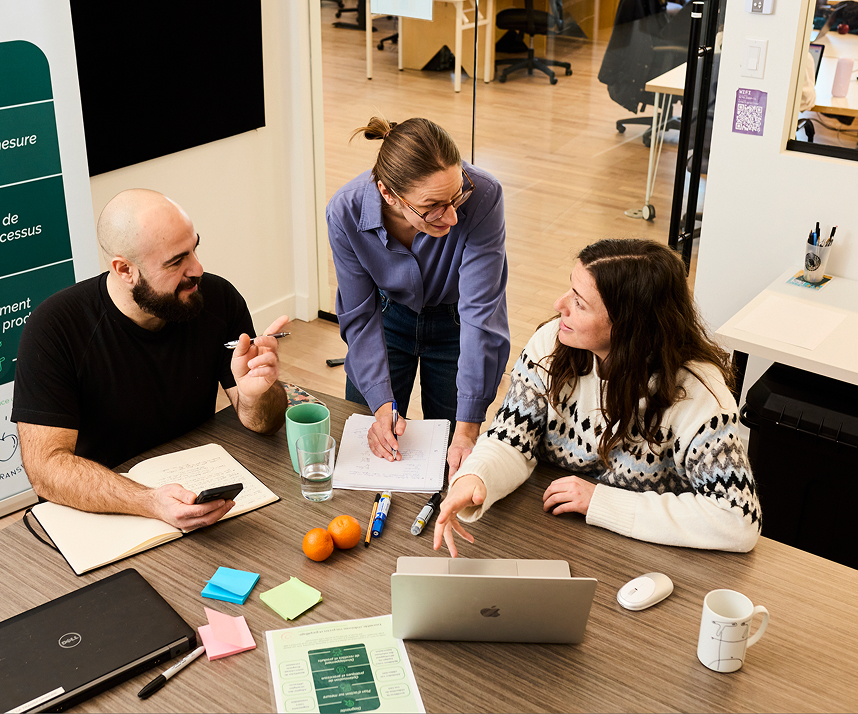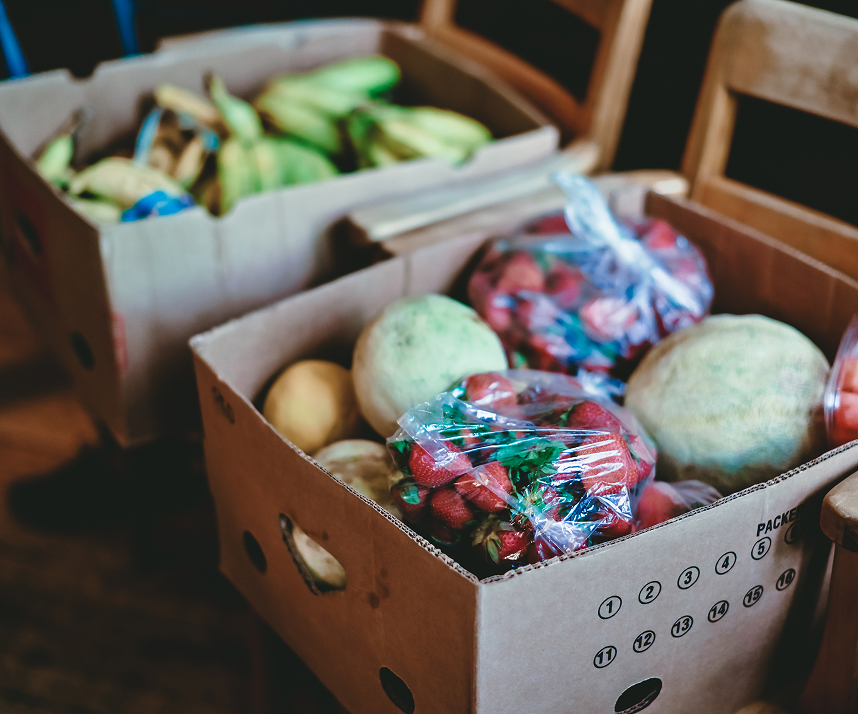Combine awareness and kindness to stop waste
- Opinion
Écrit par Marie-Pier Ethier
22 May 2024
Let’s start with a small test.
Think again when you wake up.
The body still heavy, you calmly recover your spirits, and the plans of the day are drawn in your head. Your first thought emerges: what is it?
“Today I am wasting food!”
… Unless you are a cheap cartoon cartoon, I bet you’re not!
Yet, we find ourselves in Quebec with 1.2 million tonnes per year of edible food wasted, and of which 28% comes from the consumer, that is to say me, you, us. That’s 336,000 tons coming directly from our kitchens.
It is clear that no one wakes up in the morning with a “to-do list” of things to waste, but we must admit that we all have a role to play in this collective balance.
What is our fair share? And how to do it?
Beyond tips and tricks : a way of life
Feeding is a gesture that transcends the barrier of basic need.
Beyond having to eat in order to survive, we enjoy cooking, tasting, discovering new foods, or returning to our favorite dishes to visit our memories. Sharing a meal with people brings us closer as human beings and allows us to connect to a territory by enjoying its riches.
In the hyperactive daily life of our busy lives, preparing meals has become a task to be performed, such as washing, washing dishes, cleaning… Waste, while not indifferent to it, is therefore perhaps lower on our list of priorities. How to give it more importance?
The true value of food… and people behind it.
We rarely take the time to realize the amount of resources necessary for the production of a single cucumber or a basket of blueberries; how does it count in time, money, energy? Reconnecting with food also means taking the time to understand who is producing it, under what conditions – human, financial, meteorological – and where it comes from.
Let’s go meet the people who feed us according to the possibilities available to us; visit public markets and farmers’ kiosks, or subscribe to baskets of vegetables, dare to talk to our local producers, and ask questions about the current season. We risk discovering a lot, starting with the whole human dimension and the incalculable efforts behind our asparagus boot, in appearance quite innocuous…
Understanding the process, it makes you want to take care of the product and enjoy it until the last bite!
Eat seasonal
If eating in season does not evoke a very glamorous image for many people, let’s note that we are far from the time of our grandparents!
Currently, the abundance of products available year-round in grocery stores sometimes makes us forget that there is a time for everything, and that’s precisely what makes it all precious. Connecting with the seasonal dimension of food makes us appreciate them all the more, in their ephemeral nature; the taste of freshness and proximity of the first strawberries here are equal to the pleasure that we experience eating them!
While it is true that our northern environment can limit us in our choices of winter crops, it is nevertheless important to say that the farmers here work very hard to improve the supply, so we eat something other than potatoes and turnips! Let’s give them the opportunity to pique our curiosity with foods adapted to our climate, while respecting the environment and our territory.
In fact, the excellent documentary Harvest the Winter describes very well the reality of winter agriculture in Quebec in 2024 and perfectly debunks the tenacious belief of a local diet that is not diversified during the cold season.
So, let’s make the most of it and stock up in times of plenty! This is what the previous generations did, by multiplying conservation techniques (dehydration, canning, marinades, fermentations, etc.) in order not to lose a crumb of their crops, and above all, limit waste!
Small gestures count
If it were true that “it doesn’t matter” to throw away the last few soft bites of our hasty lunch, or to compost our sad vegetables forgotten in the bottom of the fridge, then this famous 28% mentioned earlier would not exist.
That said, if all these small amounts accumulate, then it is also true for the small gestures; a few are enough for many to make a significant difference.
But where do we start?
An interesting method is to look at your habits and consider three main factors :
- Wasted food
- The quantity
- The context that encouraged this waste
We like to use a self-diagnostic card, but a list in your phone or the good old paper and pencil next to the fridge is just as useful and effective.
By gambling for at least one month, we can carefully observe which practices are more conducive to waste.
Then we try to install small changes, one at a time. By this approach, we seek above all to adopt a conscious and caring approach that will gradually influence our daily habits for the better, and in a sustainable way.
To help yourself ask the right questions, develop pro reflexes and even save (!!), we suggest you without moderation the (re) reading of this article on our site, filled with tips and concrete applications.
Let’s get out of our kitchens !
What can give us the impression that our small efforts do not make a difference is that we sometimes feel very alone in doing them.
Conversely, when you talk to people who have a similar vision, the feeling of powerlessness then diminishes, replaced by the motivation to add water to the mill of large-scale change.
Let’s get out of our kitchens and connect the one (s) to the others!
- Volunteering : At La Transformerie, we experience it every day. The volunteers who give us time not only allow our activities to continue their mission of raising awareness and saving food, but also to act as the theater of magnificent and unexpected encounters! People of all ages and from completely different backgrounds come together around common values to advance a cause that is close to their hearts. We are witnessing human conversations rich in ideas, each more ingenious than the other.
- Putting social media at the service of our values : The advantage of social media is that many groups exist to allow us to exchange tips, solutions, and even our states of discouragement, and receive support from them. With keywords such as “anti-waste” and “zero waste”, a range of options immediately appears, including several groups bringing together people from all walks of life and regions.
- Open dialogue with the people involved : Businesses, our workplaces, events, etc. are all places where waste can go unnoticed. Dare to open the dialogue with those in charge to understand their reality and see if it is possible for them to offer products and a management of resources more adapted to your values. You will be surprised by the effect that open and respectful dialogue can have on ways of doing things!
- Review our aesthetic criteria : The cost of living increases with the severity of the aesthetic criteria: it is quite normal to hope to have the most beautiful vegetables by paying them dearly! But what happens to those considered imperfect, equally edible and no less tasty? Do we get used to lowering our standards and expectations and express them; why not offer our merchants baskets of products that have been downgraded for less in order to avoid waste?
- Uniting our voices to be heard : Yes, petitions make a difference! An eloquent example is the initiative of three Montrealers, including Atlandide Desrochers, who in 2019 was able to collect more than 15,000 signatures calling for a public consultation on waste at the City of Montreal. With the help of social media and in association with Guillaume Cantin (co-initiator of La Transformerie) as a co-spokesperson, the consultation took place and several recommendations made to the City are currently being implemented. Let us believe that by coming together, we have the potential to make a difference!
Everyone has his share, but not each for himself !
Some would like the changes to be made quickly, others are reluctant for reasons that belong to them. Between the two, a wide spectrum of people who want to do their part but still don’t know where to start.
Although it is true that small gestures are not the solution in themselves, they are not useless, quite the opposite.
All solutions, whether large or small, are complementary. The alternatives will not be the same in the city as in the countryside, nor even from one region, culture and way of life to another.
It is simply a matter of seeing which ones apply best to our daily lives, in this evolving balance between resilience and kindness.
Regardless of our situation, one thing is certain: taking part in the conversation means ensuring that your reality is represented in the search for solutions.
It is also about participating in a healthy debate in the public space and feeding our collective intelligence on an issue that concerns everyone.
Whoever you are, wherever you are, choose your favorite tools and join us in eliminating food waste!

